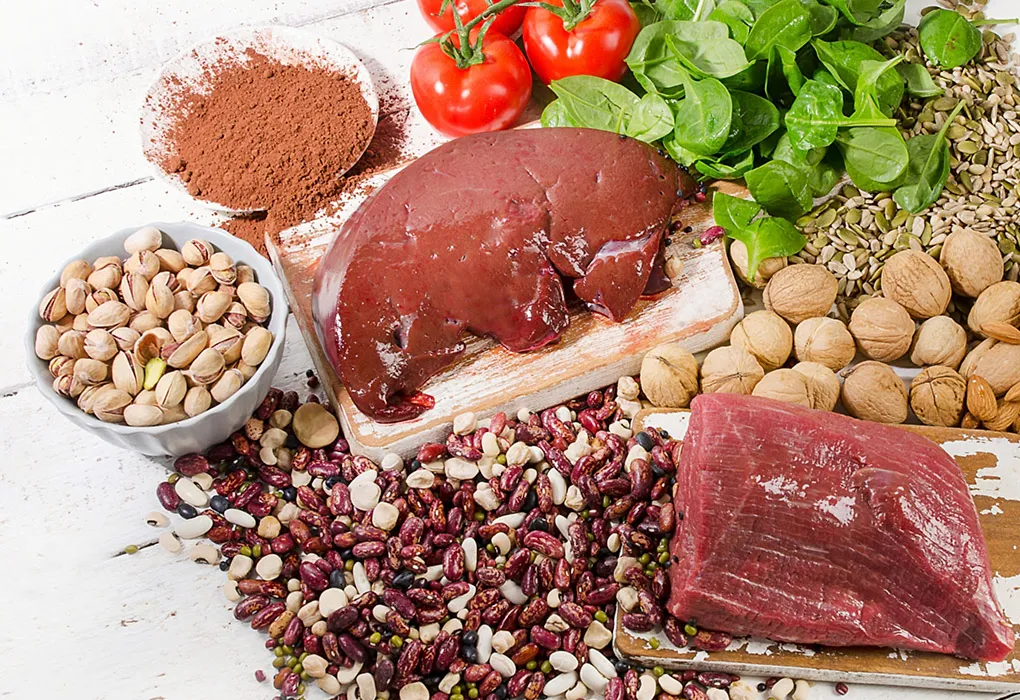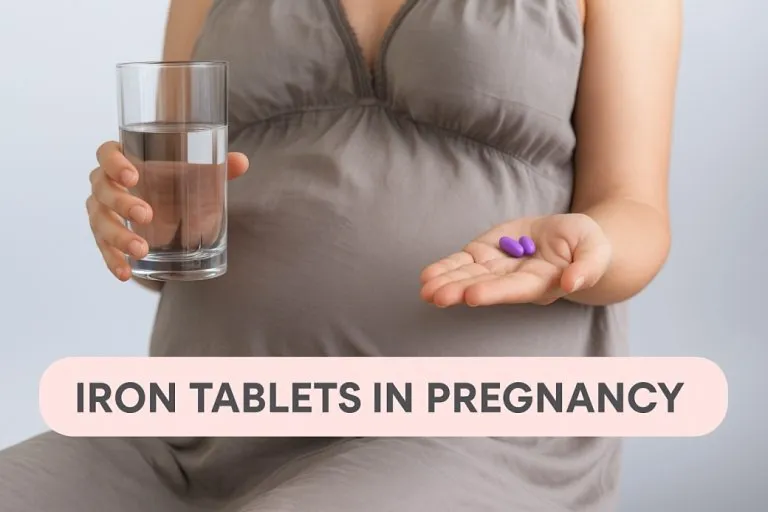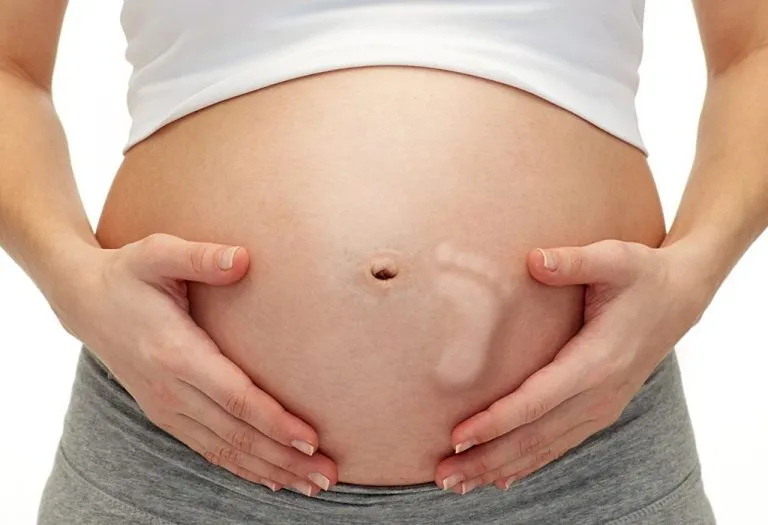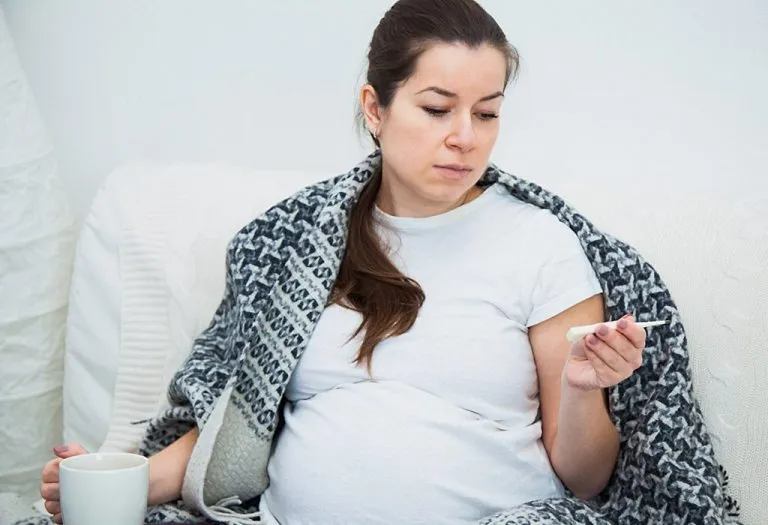Iron Supplements During Pregnancy – Benefits and Risks
Learn how iron tablets support your baby’s growth, prevent anemia and keep you feeling healthy during pregnancy.

- Can I Take Iron Supplement While Pregnant?
- Importance of Iron During Pregnancy
- How Much Iron Is Required During Pregnancy?
- When Does the Doctor Recommend Iron Tablets for Pregnancy?
- Benefits of Iron Supplements During Pregnancy
- Which Is the Best Time to Take Iron Tablets During Pregnancy?
- Side-effects of Iron Pills While Pregnant
- Things to Remember
- Iron-Rich Foods for Pregnant Women
- FAQs
Pregnancy is an extremely crucial period for both the mother and the baby. Since the onus is on the mother to provide vital nutrients to her baby, it is imperative that she takes care of her diet as much as possible and takes supplements as prescribed during prenatal visits to the doctor. About nutrition, iron plays a very significant role during pregnancy, i.e. making haemoglobin. Pregnant women need iron to make haemoglobin so they can pass the oxygen to the baby for its growth and development (1). When a mother is not able to produce sufficient iron, the baby then uses the iron from the mother’s blood to grow, which eventually causes iron deficiency in the pregnant woman. In case of such deficiency, is taking iron supplements during pregnancy safe? There’s plenty of information floating around about iron pills and pregnancy. Let’s continue reading the article to learn whether taking iron tablets during pregnancy is safe.
Can I Take Iron Supplement While Pregnant?
The body requires iron to make haemoglobin, a protein in your red blood cells (RBC) that aids in bringing oxygen to the organs and tissues for both you and your child. As you are supporting the growth of your baby, your body will automatically produce more blood; however, to do this, your body will require additional iron. If your diet doesn’t provide you with enough iron to produce enough blood for two, you are most likely going to be asked by your healthcare provider to take some additional iron supplements to get that extra blood flowing.
Importance of Iron During Pregnancy
Iron is, without a doubt, important for the health of the mother and the baby. Here are some benefits explained in detail, justifying our preceding statement:
1. Stimulates Haemoglobin Production
Iron is a vital part of haemoglobin (Hb), the protein in the RBCs (red blood cells) that carries oxygen from the lungs to the body, including the baby in the womb. During pregnancy, blood volume increases, and oxygen demand rises, making dietary iron essential (2).
2. Reduces the Chances of Premature Birth and Low Birth Weight
Iron deficiency or anaemia can lead to preterm or premature birth and low birth weight (3). Ensuring enough iron intake helps reduce these risks, promoting a healthier pregnancy.
3. Promotes Fetal Brain Development
Iron supports the baby’s brain and nervous system development, which is why adequate iron intake during pregnancy is crucial for healthy fetal growth and development.
4. Keeps Maternal Health in Check/Deals With Fatigue
Sufficient iron levels are essential for the mother’s health, and taking iron supplements for pregnant women can help prevent fatigue, dizziness, and increased infection risk.
How Much Iron Is Required During Pregnancy?
The following table is a general requirement for iron supplements that women are advised to take. You can consult your doctor for the recommended dose of iron tablets in pregnancy as per your pregnancy progress.
| Dosage | 27 mg |
| Frequency | Once, daily |
| Duration | After the first trimester |
Source: Nutrition Recommendations in Pregnancy and Lactation (4)
When Does the Doctor Recommend Iron Tablets for Pregnancy?
The prenatal vitamins that women are advised to take during pregnancy contain the required amount of iron in them. Apart from this, it is best to gain the required amount of iron through a balanced diet that is rich in the element. There are times, however, when your doctor may inform you that you need to take an additional amount. The reasons for this will be different for each woman, but it is most commonly found that women who live in places where anaemia is prevalent will undoubtedly require additional iron supplements.
If you are vegetarian or vegan, you may require more iron supplements than other women as your diet may not be able to provide you enough on a daily basis. Iron tablets are usually recommended after the 3rd month of pregnancy. Always inform your doctor if this is the case so that your doctor can perform regular checks on your iron and haemoglobin levels during your routine check-ups and can tell you if you need iron tablets in pregnancy and when to start.
Benefits of Iron Supplements During Pregnancy
Health experts may recommend iron supplementation to pregnant women if their iron levels are low and their dietary intake is also insufficient. Here are some benefits of iron supplements during pregnancy:
- Iron supplements stimulate haemoglobin production to meet the oxygen demands of the baby in the womb.
- It covers up for the dietary gap.
- It is extremely essential for the foetuses’ neurodevelopment.
Which Is the Best Time to Take Iron Tablets During Pregnancy?
If you have been asked to consume supplements, your doctor will inform you about how to take an iron tablet during pregnancy. Most doctors only recommend iron tablets after the first 12 weeks of pregnancy. It is also difficult to digest in early pregnancy and is not required in the first trimester.
You will be advised to consume the iron supplements at least one or two hours before or after your meal. It’s best to avoid taking it with tea, coffee or even milk as this can reduce the effects of the tablets. Instead, they should be taken with plain water.
Side-effects of Iron Pills While Pregnant
Iron tablets and pregnancy often go together because many women need extra iron to support their growing baby. While iron is essential during pregnancy, taking too much can lead to some unpleasant side effects. These are explained below:
1. Dark Urine and Stool
A lot of women who take iron supplements find that their urine becomes darker. Some also notice a darkening of their stools, either looking dark green or black. Both of these things are normal, and everything should go back to normal once you stop taking the supplements.
2. Discomfort in the Gastrointestinal Tract
You may experience some gastrointestinal irritation such as cramping or stomach aches. Take the supplement after a meal to avoid this.
3. Constipation
A lot of women who take iron supplements suffer from constipation. If you are experiencing this, add more fibre and water to your diet.
4. Nausea and Vomiting
Taking iron supplements often causes vomiting and nausea, as it generally makes morning sickness worse. Take your supplements after meals to ease discomfort and avoid acidity. If you get a fever as well, contact your doctor.
5. Iron May Not Get Absorbed in the Body
You may be taking your iron supplements every day without fail – but the iron may not be getting absorbed in the body efficiently. Consuming certain foods along with your iron supplements can prevent the absorption of the mineral properly. These foods include whole grains, dairy, coffee, milk, and tea. To beat this problem, it’s best to consume iron supplements along with foods rich in vitamin C, as they are known to aid the absorption of iron in the bloodstream.
There is a serious misconception that states that iron tablets during pregnancy make the baby dark. This is only an old wives’ tale, as the only thing that can impact your baby’s complexion is genetics.
Things to Remember
Here are a few things you should keep in mind when taking iron supplements:
- Drink plenty of water.
- If you experience any unpleasant side effects, taking the supplement after meals may be better than taking it on an empty stomach.
- If the side effects are still present, change the dosage of iron
- Ask your doctor if it is okay for you to take a stool softener if you really need it.
Iron-Rich Foods for Pregnant Women
A diet rich in iron is as important as consuming iron supplements during pregnancy. The following are foods rich in the element (5):
- Soybeans
- Lima Beans
- Lentils
- Kidney Beans
- Oysters
- Raisins
- Beef Liver
- Chicken Liver
- Lamb
- Chicken
- Spinach
- Salmon
- Cereal
- Prunes
- Sunflower Seeds
- Pumpkin Seeds

FAQs
1. What is considered a normal iron level in pregnancy?
The normal level of iron during pregnancy is usually between 30-150 micrograms per decilitre (mcg/dL) or 136-680 nanomoles per litre (nmol/L). Since the demand for iron changes during pregnancy with trimester, it is important to consult a doctor to interpret accurate iron levels during pregnancy.
2. Why does dietary iron demand increase during pregnancy?
The demand for iron during pregnancy increases by almost 50% to support the oxygen needs of the developing baby. This is the reason that dietary iron is encouraged, and iron supplementation is recommended if there is iron deficiency.
3. What is the ideal haemoglobin level during pregnancy?
Normal haemoglobin levels for women of childbearing age range from 12 to 16 grams per deciliter. During pregnancy, the minimum normal haemoglobin levels are 11 grams per deciliter in the first and third trimesters and 10.5 grams per deciliter in the second trimester (6). Haemoglobin concentration below 9.0 g per dL (90 g per L) or hematocrit less than 27 per cent (0.27) confirms anaemia (7).
4. Can taking too much iron be harmful during pregnancy?
Yes. Excessive iron intake can lead to toxicity, especially if combined with multiple supplements that contain iron. High levels may cause digestive symptoms or, in rare cases, affect liver function.
During pregnancy, it is best to always consult with your doctor regarding any supplements or medications that you may want to take, even if they are herbal or generally said to be good for you. This is because each woman will have different requirements based on her body.
Also Read:
Vitamin C in Pregnancy
Vitamin A when Pregnant
Supplements during Pregnancy
Consuming Antacids in Pregnancy
Use of Sleeping Pills during Pregnancy
Taking Vitamin B2 (Riboflavin) while Pregnant
Was This Article Helpful?
Parenting is a huge responsibility, for you as a caregiver, but also for us as a parenting content platform. We understand that and take our responsibility of creating credible content seriously. FirstCry Parenting articles are written and published only after extensive research using factually sound references to deliver quality content that is accurate, validated by experts, and completely reliable. To understand how we go about creating content that is credible, read our editorial policy here.




































